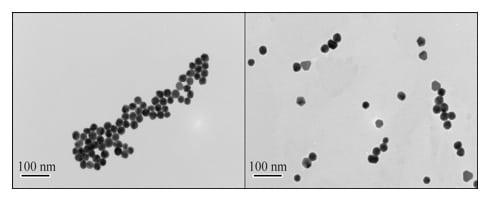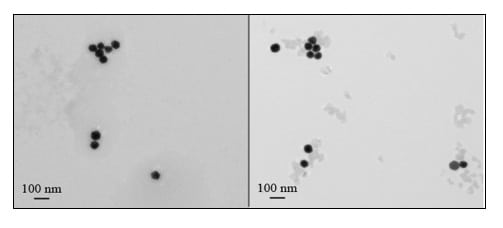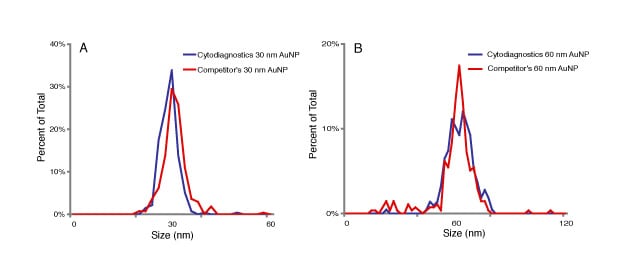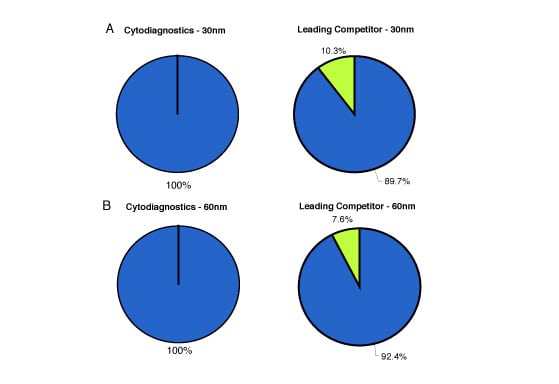Cytodiagnostics vs Leading Competitor
Colloidal gold is a versatile nanomaterial that has been used as an essential component in many biomedical applications, from diagnostic assays and catalysis to in vivo tumour targeting.
The unique optical properties, consistent crystal structure and shape of colloidal gold provide important advantages and versatility. The proprietary synthesis method used by Cytodiagnostics provides the highest quality of any colloidal gold on the market, resulting in batches of pure spheroidal particles with better size and shape consistency than the leading competitors. This translates into higher performance and reduced costs associated with developing and running your assays.
To show the superior quality of Cytodiagnostics gold nanoparticles they were compared with a leading competitor’s product. For this purpose, two different gold nanoparticle preparations of different sizes were characterized according to their size and shape. In summary, the results of the comparison show the supremacy of Cytodiagnostics gold nanoparticles over its leading competitor in all parameters/categories tested.
Representative images from TEM measurements comparing 30nm and 60nm sizes between Cytodiagnostics and leading competitor are displayed in figures 1 and 2. Just by observing the images, one can clearly see that size and shape monodispersity of Cytodiagnostics gold nanoparticles is far better than the leading competitor.

Figure 1. TEM image of 30nm Gold Nanoparticles, Cytodiagnostics (left side) and leading competitor (right side).

Figure 2. TEM image of 60nm Gold Nanoparticles, Cytodiagnostics (left side) and leading competitor (right side).
Comparison of Size Distribution
A comparison of average particle size along with size distribution data (coefficient of variance (CV) and standard deviation) is shown in table 1 and figure 3.
Our proprietary synthesis methodology provides better size monodispersity of colloidal gold nanoparticles over the leading competitor. The actual size of Cytodiagnostics 30nm colloidal gold nanopartilces is 29.49nm with a standard deviation of 2.87nm (10% CV), while the leading competitor’s gold nanoparticles actual measured size is 31.48nm with a standard deviation of 3.7nm (12% CV). The same trend is true for 60nm colloidal gold nanoparticles, see table 1.
Table I. Size distribution comparison to competitor.
| Intended Size | Cytodiagnostics | Purchased Size | Leading Competitor | ||||
|---|---|---|---|---|---|---|---|
| Size | CV | Std Dev | Size | CV | Std Dev | ||
| 30 | 29.49 | 10% | 2.87 | 30 | 31.48 | 12% | 3.7 |
| 60 | 62.29 | 10% | 6 | 60 | 61.48 | 16% | 9.79 |

Figure 3. Size histograms of 30nm (A) and 60nm (B) colloidal gold nanoparticles, Cytodiagnostics (blue) and leading competitor (red).
Comparison of Gold Nanoparticle Shape
Like the size, the shape of Cytodiagnostics gold nanoparticles is much better compared to that of its leading competitor as shown in table 2. The following table and data clearly identifies which product is better. Cytodiagnostics gold nanoparticles have a superior aspect ratio (length/width) compared to that of competitor’s particles and show a high level of monodispersity. In addition, our particles are 100% spherical in shape in comparison to that of our leading competitor that have 89.7% (30nm) and 92.4% (60nm) spheroids and the remaining particles shaped as triangles, pentagons, hexagons etc, see figure 4. The high shape uniformity of our colloidal gold will minimize the variability within your assay by e.g. allowing control over the available surface area while absorbing proteins to the gold. This translates into higher performance and reduced costs associated with running your assay. In summary, Cytodiagnostics gold nanoparticles show better quality than the leading competitor in all respects.
Table II. Shape comparison to leading competitor.
| Intended Size | Cytodiagnostics | Purchased Size | Leading Competitor | ||
|---|---|---|---|---|---|
| Aspect Ratio (L/W) | Shape CV | Aspect Ratio (L/W) | Shape CV | ||
| 30 | 0.90 | 7% | 30 | 0.88 | 11% |
| 60 | 0.92 | 7% | 60 | 0.90 | 12% |

Figure 4. Shape comparison (percent spherical) of 30nm (A) and 60nm (B) colloidal gold nanoparticles, Cytodiagnostics (left side) and leading competitor (right side).